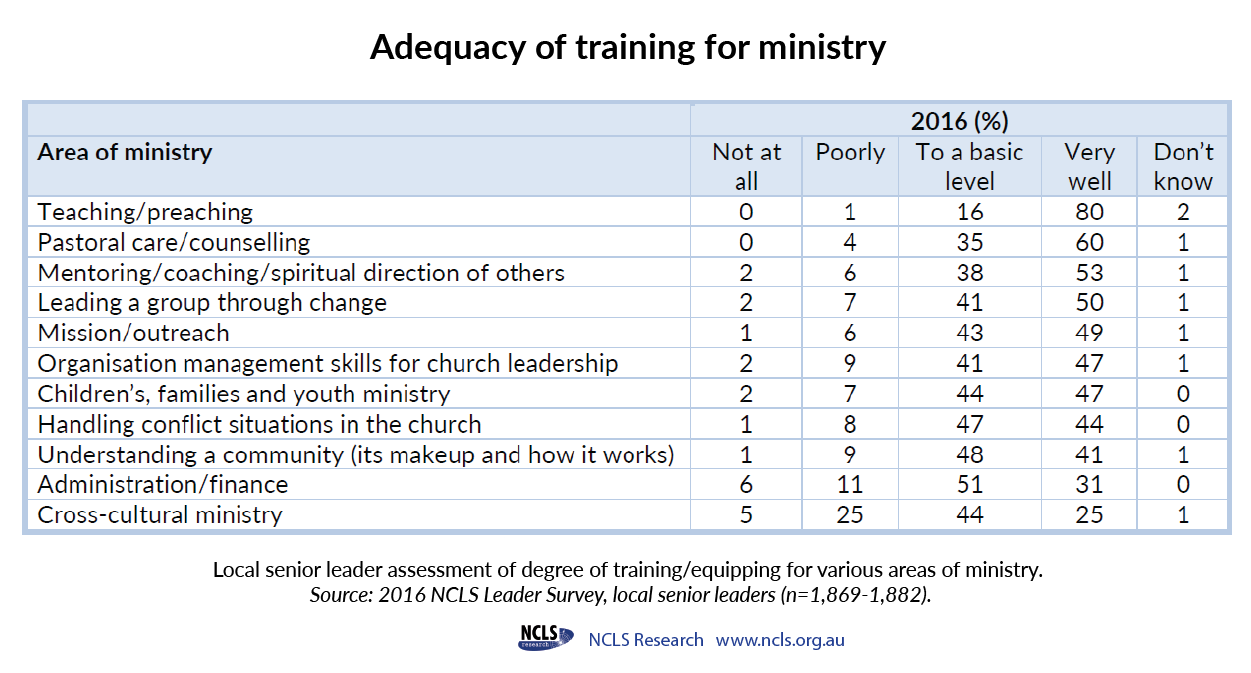When it comes to education, 74% of all local senior leaders are university graduates. In training for ministry, 32% have a degree and 31% have a postgraduate qualification in theology or ministry.
These leaders report both strengths and deficits in their preparation for ministry, highlighting a particular need for better cross-cultural training.
Education levels
In 2016, 4% of senior local church leaders had attained a trade certificate, 14% a diploma or associate diploma, 34% had a degree and 40% had a postgraduate degree or diploma. These results are very similar to 2011, with a slight increase seen in postgraduate-qualified leaders between 2011 and 2016.
Ministry qualifications
When it comes to ministry qualifications, levels of training range from no formal qualification (10%), on the job training (4%), lay preacher's certificate (3%), Bible college qualification (7%), diploma in theology/ ministry (13%), degree in theology/ministry (32%), postgraduate diploma/ degree (27%) to a doctorate (4%).
Levels of formal education were much lower among Pentecostal leaders than among leaders from the other denominations. Some 37% of Pentecostals held a university degree (18% with a degree in a ministry-related qualification), compared with 83% of leaders from other denominations (74% with a degree in a ministry-related qualification). A majority of Pentecostals held a Bible college qualification or a diploma in theology/ministry.
Analysis of Protestant churches that participated in the 2011 NCLS found that local senior leaders having a degree in theology was not statistically related to the church’s newcomer levels, growth or young adult retention (Pepper & Powell, 2017).

Adequacy of training for ministry
Leaders were asked how adequately they felt trained and equipped in a range of areas. Across all denominations the area where leaders felt the most equipped, by a substantial margin, was “teaching/preaching” (80% very well trained/equipped). Other strong areas were “pastoral care/counselling” (60%), “mentoring/coaching/spiritual direction” (53%) and “leading a group through change” (50%). The area where leaders by far felt the least equipped was “cross-cultural ministry” (30% “poorly” or “not at all” equipped).

Comparisons between denominations indicate that Pentecostals tended to feel the most confident, especially in relation to organisational management, mentoring, leading a group through change and handling conflict. Exceptions were pastoral care/counselling, cross-cultural ministry and understanding a community (Catholics and Mainstream Protestants were the most confident), teaching/preaching (Mainstream Protestants were the most confident) and mission/outreach (no differences between the denominations).
Results of this kind are an opportunity for denominational leaders to consider where extra training may help local leaders meet the challenges of ministry more effectively and reduce experiences of stress in their role. Particularly in the expressed shortfall of feeling unprepared for cross cultural ministry, this area highlights an important issue for church leaders and those who train them.



